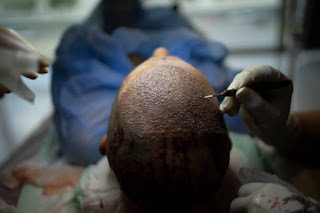Hair Transplant
Choosing the Right Hair Transplant Surgeon: A Step-by-Step Guide
Choosing the right hair transplant surgeon is a crucial step in achieving a successful and natural-looking result. A skilled and experienced surgeon can make a significant difference in the outcome of the procedure. Here's a step-by-step guide to help you make an informed decision when selecting a hair transplant surgeon:
1. Research and Education:
- Start by researching the basics of hair transplant procedures, different techniques (such as FUT and FUE), and common terminology.hair transplant Clinic in islamabad This foundational knowledge will empower you to ask relevant questions during consultations.
2. Credentials and Qualifications:
- Verify the surgeon's credentials and qualifications. Look for a board-certified plastic surgeon or dermatologist with specific training and expertise in hair restoration. Board certification ensures that the surgeon has met certain standards of education and experience.
3. Experience in Hair Transplants:
- Assess the surgeon's experience in performing hair transplants. Inquire about the number of procedures they have completed, their success rates, and their specialization in either FUT or FUE techniques. An experienced surgeon is more likely to deliver optimal results.
4. Before-and-After Photos:
- Ask to see before-and-after photos of previous patients who underwent similar procedures. Examining real-life results can give you a visual understanding of the surgeon's skill and the potential outcomes you can expect.
5. Patient Reviews and Testimonials:
- Read reviews and testimonials from previous patients. Platforms such as Google, Yelp, and specialized hair restoration forums can provide insights into the experiences of others. Pay attention to both positive and negative feedback to get a balanced perspective.
6. Consultation:
- Schedule consultations with multiple surgeons to discuss your goals and assess their recommendations. Pay attention to the surgeon's communication style, how thoroughly they address your questions, and whether they establish realistic expectations.
7. Surgical Technique:
- Understand the surgeon's preferred surgical technique. While both FUT and FUE are effective, some surgeons may specialize in one over the other. The choice may depend on factors such as your hair type, donor area, and personal preferences.
8. Technology and Facilities:
- Inquire about the technology and facilities used by the surgeon. Modern clinics equipped with advanced tools and techniques often provide more efficient and precise procedures, leading to better results and a more comfortable experience.
9. Team and Support Staff:
- Assess the qualifications and experience of the surgeon's support staff. A well-trained team contributes to the smooth execution of the procedure and ensures that you receive comprehensive care throughout the process.
10. Transparent Pricing:
- Request a detailed breakdown of the costs involved in the procedure. Transparent pricing should include the surgeon's fees, facility fees, and any additional costs. Be cautious of hidden fees or extremely low prices that may compromise the quality of the procedure.
11. Communication and Comfort:
- Evaluate how comfortable you feel communicating with the surgeon. A good surgeon should listen to your concerns, provide clear explanations, and establish open and honest communication. Feeling at ease with your surgeon is essential for a positive experience.
12. Post-Operative Care:
- Inquire about the post-operative care and support provided by the surgeon. A comprehensive aftercare plan ensures that you receive guidance on recovery, potential complications, and long-term maintenance.
13. Follow-Up Procedures and Planning:
- Discuss the potential need for follow-up procedures and long-term planning. Hair loss is a dynamic process, and a reputable surgeon will help you develop a plan for future interventions or maintenance if necessary.
14. Trust Your Instincts:
- Trust your instincts after conducting thorough research and attending consultations. If something doesn't feel right or if you have lingering doubts, consider seeking a second opinion or exploring other options.
Choosing the right hair transplant surgeon is a personal decision that requires careful consideration. By following these steps and taking the time to thoroughly research and evaluate potential surgeons, you increase the likelihood of a successful and satisfying hair transplant experience.




Comments
Post a Comment